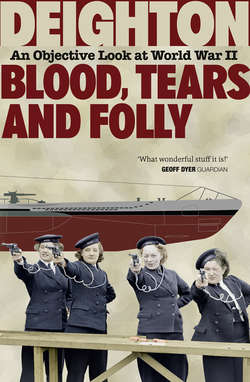Читать книгу Blood, Tears and Folly: An Objective Look at World War II - Len Deighton - Страница 52
The British and their prime minister: Chamberlain
ОглавлениеIt has become convenient to think of the war as a confrontation between Adolf Hitler and Winston Churchill, but Britain’s leader in the years leading up to the war was Neville Chamberlain. Although very much in the minority, there are still those who say that Chamberlain was an astute statesman. They prefer to believe that Chamberlain, by appeasing Hitler and letting him march into Austria and then Czechoslovakia, gained time for Britain to rearm. There is nothing to support this contention.
By 1937 Hitler had provided Germany with formidable fighting forces. His troops had reoccupied the demilitarized Rhineland in open defiance of the peace treaty. In Britain there were no signs of a resolve to confront Germany. According to the foreign minister, Anthony Eden, the elder men of the cabinet were not convinced of the need to rearm.3 Chamberlain thought armaments were a wasteful form of expenditure and saw no reason to believe that war was bound to come.4
In the previous cabinet, Chamberlain had been chancellor of the exchequer. He knew how much a government’s popularity depended upon keeping income taxes low. Opposition politicians were certainly not demanding rearmament. Clement Attlee, leader of the Labour (Socialist) party, had said in December 1933: ‘We are unalterably opposed to anything in the nature of rearmament.’ His party stuck to that line and campaigned against rearmament right up to the outbreak of war. Prominent churchmen and intellectuals said little about the persecution of German Jews, even though refugees brought ever more appalling stories of what was happening. Priests, politicians and writers combined in such pacifist organizations as the Peace Pledge Union, and the influential voices of Aldous Huxley, Siegfried Sassoon and Vera Brittain were heard arguing persuasively against any preparations for war.
Everywhere pacifism was coloured by the fear of what fleets of bombing aircraft might do to large cities. The writings of General J. F. C. Fuller and Bertrand Russell, and the H. G. Wells science-fiction book Things to Come (and the frightening Alexander Korda film based upon it), fanned fears of impending devastation and chaos by bomber fleets. It was against this background that Chamberlain made his decisions about rearmament.
Seen in photographs and cartoons, Chamberlain appears a wretched and ridiculous figure with drawn face and craning neck, but an American who met him in 1940 was impressed:
Mr Chamberlain was seated alone at his place at the Cabinet table when we were both shown in. He was spare, but gave the impression both of physical strength and energy. He appeared to be much younger than his seventy-one years. His hair was dark, except for a white strand across his forehead. His dominating features were a pair of large, very dark, piercing eyes. His voice was low, but incisive.5
Chamberlain was concerned with his personal popularity and he spoke of it frequently. The welcoming crowds he saw on his visits to Munich and Rome were reassuring to him. He even remarked that Mussolini did not seem jealous at being welcomed less warmly than Chamberlain and the British party. Chamberlain’s ego led him to believe that his personal negotiations with Hitler were a statesmanlike contribution to world peace. In fact he did little but give way to Hitler’s bullying, and ratify and assist the aggressions he claimed to be stopping. In addition Chamberlain’s well publicized meetings with Hitler encouraged the more extreme Nazis while demoralizing the few influential Germans who opposed Hitler’s methods.
The persistent belief that war could be avoided by appeasement made Chamberlain reluctant to form an alliance with Stalin’s USSR. He and his colleagues shared a well merited distaste for Stalin’s violent and repressive empire, and yet an alliance with Russia – as the British chiefs of staff pointed out – might be the only practical way to stop Hitler. When, in the summer of 1939, General Ironside (inspector-general of Overseas Forces) returned from a trip to Danzig, Chamberlain asked him to confirm that it seemed impossible to come to terms with the Russians. Ironside would not confirm it; he said it was the only thing that Britain could do. Chamberlain was not pleased at this response and retorted: ‘The only thing we cannot do.’6
Many military men said that the Red Army was worthless, and that an alliance with the USSR would be only an encumbrance. Britain’s ambassador in Berlin added to Chamberlain’s confusion with a ridiculous warning that a British alliance with Russia would provoke Germany into an immediate war. (To prepare peacetime Germany for a war against Russia would have taken many months.) While Chamberlain vacillated it was Hitler who saw the advantages that a pact with Russia would provide.
Hitler’s occupation of the Rhineland and then Austria had been welcomed by virtually the whole population of those German-speaking regions. Blumenkriege the German soldiers called these occupations; flower wars in which the soldiers got kisses and posies, not bullets and shells. But the people of Czechoslovakia – apart from the vociferous Volksdeutschen who lived in the border regions – had no love for the Germans.
